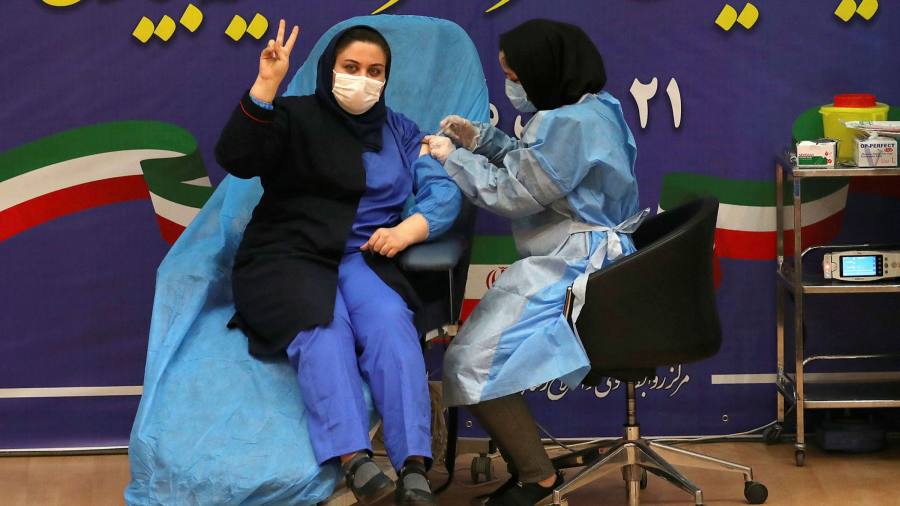[ad_1]
With huge national fanfare, Iran rolled out its Covid-19 vaccine campaign with a television broadcast of the health minister’s son receiving Russia’s Sputnik V jab.
“My father would not have let me have this vaccine if there was any problem with it,†said Parsa Namaki, the son of health minister Saeed Namaki and a student in Iran’s top engineering school. “I insisted,†he added, “in case it can have any impact to help build public trust.â€
With 58,469 deaths from coronavirus, Iran has the highest death toll of any country in the Middle East and many in the Islamic republic are desperate for vaccines. But despite the televised vaccinations of high-profile people, there is scepticism about Tehran’s strategy, which has been complicated by geopolitics.
Ayatollah Ali Khamenei, Iran’s supreme leader, has refused vaccines from the US or UK, voicing suspicions about western drugs being trialled on Iranian citizens. The ban on western-produced inoculations prompted a backlash from doctors and on social media, as did the reliance on vaccines from Moscow.
Russia’s Sputnik V jab has been shown to have 91.6 per cent efficacy against coronavirus, a Lancet peer review has confirmed. But about 100 members of Iran’s Medical Council said last week that choosing the Russian vaccine was “unjustifiable and risky†and called on the government to buy the world’s “best vaccinesâ€.
The theocratic state, which is already immunising medical staff with the Russian jab, says that it is. It plans to source about a third of its needs from Russia, China and India as well as from the World Health Organization’s Covax programme for poorer countries, which does use western vaccines. The remaining two-thirds will come from Iranian producers.
“Covid-19 further motivated us that our country should be able to meet its own medical needs at home as much as possible,†Dr Alireza Biglari, director of the Pasteur Institute, Iran’s century-old scientific institute, told the Financial Times in an interview.
“The vaccine crisis in Europe shows us we were right to think we could not count on other countries. Even neighbours have no mercy on each other under these circumstances,†he said.
The reliance on local treatments also means that Iran will be able to quickly respond to new variants, he said.
It makes sense for Iran to rely on its own pharmaceutical industry, said Kianush Jahanpur, head of public relations of the health ministry. While medicine is exempt from international sanctions, banking restrictions have complicated imports in the past. “Under the current vaccine apartheid in the world, there might not be sufficient access for all people,†he added.
The Pasteur Institute is working on a vaccine joint venture with Cuba’s state-run Finlay Vaccine Institute, the so-called Soberana 2, which should be ready for roll out in May. Clinical trials are due to begin on 150,000 Cubans and up to 40,000 Iranians in the coming weeks. The Barkat Foundation, which is affiliated to the supreme leader’s office, has just finished phase 1 trials of COVIran, which is based on inactivated virus. Iran’s Razi Vaccine and Serum Research Institute started human trials of its Razi Cov Pars jab this week.
In practice, despite the supreme leader’s dismissal of western vaccines, Iran will access them through Covax or through imports from other countries. About 4.2m doses of the Oxford/AstraZeneca vaccine are due to arrive this month under the Covax scheme and 2m doses of Sputnik V over the next two months. Some Iranian doctors say the BioNTech/Pfizer was, in any case, beyond Iran’s budget, and would have been difficult to store and transport because of the need for cold chain storage.
While vaccine take-up in Iran is generally high, the furore over the vaccines has fuelled scepticism. “When Xanax [a tranquilliser] is not imported, for instance, doctors prescribe an Iranian equivalent for me. But it is simply not the same. I imagine that would be the difference between Iranian and foreign vaccine,†said Tannaz, a 35-year-old employee of a private company, who did not want her full name to be published. “I’m not gonna take any vaccine whether Iranian or Russian.â€Â
One comment on social media said: “The difference between Iranian and foreign-made vaccine is like the difference between Iranian and foreign-made cars. I’ve not seen one person say they will take Iranian vaccine.â€
Iran’s pharmaceutical industry has a long history of producing vaccines for diseases such as polio, hepatitis B, measles, tetanus, diphtheria and rubella, though it still relies on imports for human papillomavirus, influenza, meningitis and yellow fever vaccines. “All Iranians have Pasteur-made vaccines in their bodies,†Biglari said, shrugging off criticisms.
The institute he heads was founded by a Qajar dynasty prince who donated land and money in 1920 to help vaccinate Iranians against infectious diseases such as plague, smallpox and tuberculosis. “It is the same spirit of serving people at this institute whether it is smallpox or coronavirus,†he said. “Our 100-year-old credibility is our red line. We will remain connected to the world’s health networks while making our own vaccines.â€
[ad_2]
Source link







